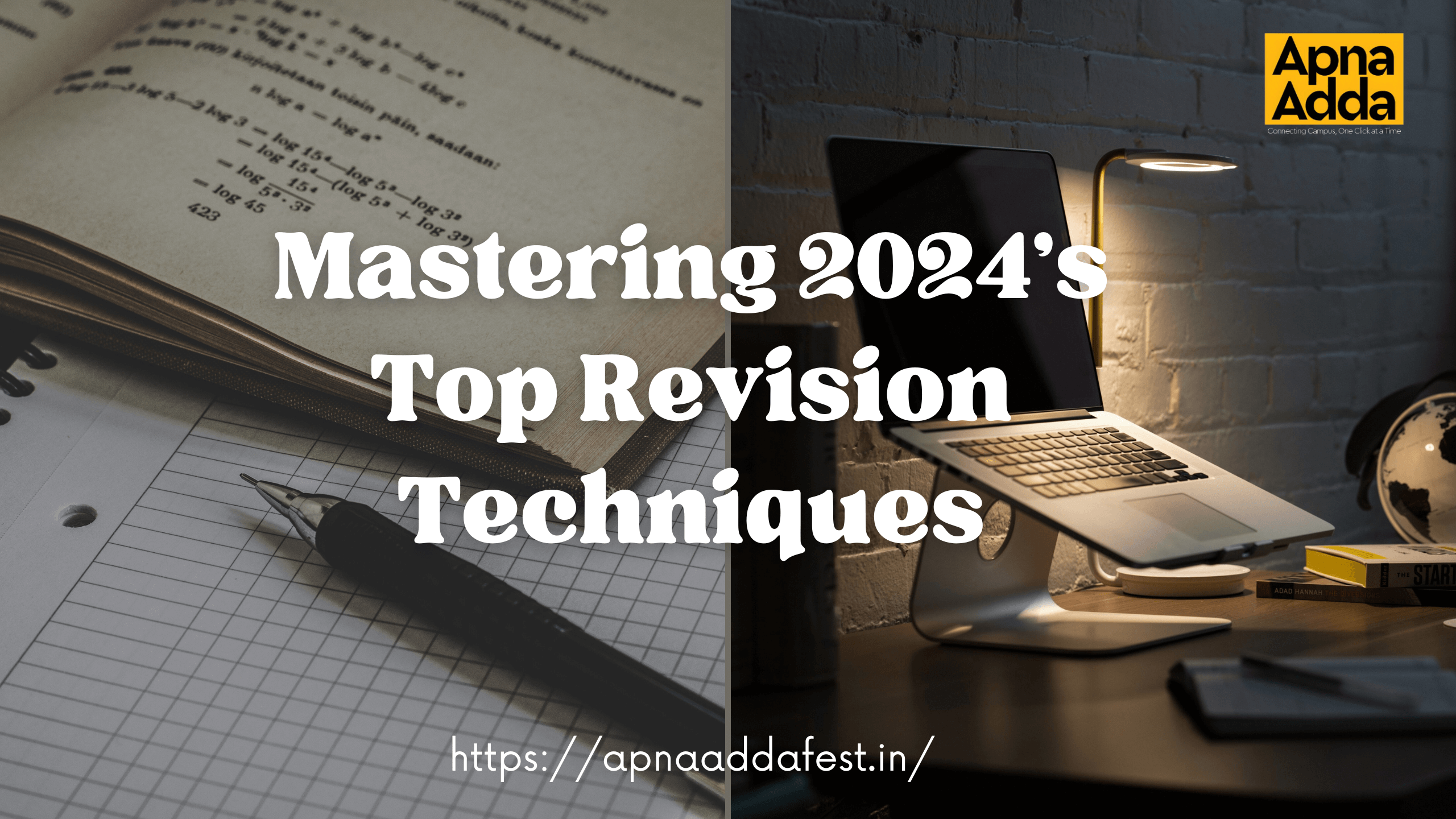Mastering 2024's Revision Techniques for CUET👁🗨

Gearing up for competitive exams, eh? Then, no doubt, loads of hustle might be going on in your mind about the revision strategies!
So, without getting delayed, let's delve into the best revision strategies of 2024!
Table Of Contents:
Understanding Exam Structure And Syllabus
1. Get To Know The Exam Pattern
Understanding the exam pattern is the first step towards a successful result. It gives you an in-depth analysis of how the exam is structured and how marks are distributed. Knowledge of this will help you prepare a productive study schedule. You can distribute essential time for various sections in the exam.
2. Understand The Syllabus
Many of the students just have an overview of their exam syllabus. This is not correct practice. It is indeed an essential part of understanding the exam syllabus. Your exam planning and paper-solving speed depend on your understanding of topics that come from the syllabus.
3. Organise Your Study Material

Gathering all your study materials is the first step towards effective revision. This includes notes, textbooks, reference materials, and any other resources you may have accumulated during your preparation. Once gathered, organizing these materials in a systematic manner based on subjects or topics will facilitate easy access and efficient study sessions.
4. Create a Study Schedule
A well-structured study schedule is indispensable for effective revision. You should allocate specific time slots for each subject or topic, taking into account their relative importance and your proficiency level. Balance your study sessions by incorporating breaks to avoid burnout and maintain focus throughout your revision period.
Effective Study Techniques
5. Prioritize Topics
Identifying the topics that carry more weightage in the syllabus is crucial for prioritizing your revision efforts. You should begin by revising topics that are more heavily weighted or have historically appeared frequently in the exam. Focus on strengthening your understanding of key concepts and theories within each subject to ensure comprehensive coverage.
6. Review Past Papers And Mock Tests
Practice solving past papers and mock tests will help you to familiarize yourself with the exam format, types of questions, rectify your mistakes and time constraints are the keys to score well. This also will help you to adjust your revision plan accordingly. Pay close attention to recurring patterns and trends in the exam to tailor your preparation effectively.
7. Utilize Online Resources
Take advantage of online resources such as video lectures, interactive quizzes, and study forums to supplement your revision. Explore educational websites and apps that offer curated content specifically tailored to the exam. These resources can provide valuable insights, explanations, and practice opportunities to enhance your preparation.
8. Engage in Group Study
Collaborating with peers or joining study groups can be beneficial for discussing challenging topics, sharing insights, and clarifying doubts. Teaching concepts to others can deepen your understanding and retention of the material, while also fostering a sense of camaraderie and motivation among group members.
10.Use Mind Maps and Flashcards


Create visual aids like mind maps or flashcards to condense complex information and aid in memory retention. Visual representations of key concepts and connections can help reinforce your understanding and facilitate quicker recall during the exam. Reviewing these visual aids regularly helps to reinforce your learning and solidify your knowledge base.
11. Allocate More Time To Weaker Subjects
Now based on the amount of material you need to cover, allocate time to each topic. Harder topics with more material warrant more time and vice versa. While your focus should remain on building conceptual strength in your weakest topics, do not forget to brush over the easier ones.
12.Tabulate Strengths And Weaknesses
Once you’ve finished your preparation for the exam, you should have a fair idea of the ground you’ve covered – the topics you’re good at and the ones you need more practice in.
Create a list of topics and rate yourself on a scale of 5. Rate a topic 5 if you’re able to tackle harder, application – based questions accurately and rate it 3 if your theoretical grasp is good but question-solving ability isn’t. A 1 would signal that you’re yet to figure out the theoretical approach itself.
Health And Well-Being
13. Prepare Instead Panic
Most of the students become anxious and start panicking after reading the syllabus and they just waste a lot of time just procrastinating about their preparation and the time they have to invest in preparation they are wasting it by panicking and worrying about the exam. The students must stick to their plan or strategy wholeheartedly, which will surely work for them.
14. Stay Healthy And Manage Stress



Prioritize self-care by maintaining a balanced diet, getting adequate sleep of at least 8 hours which is non-negotiable, and incorporating regular exercise and meditation into your routine. Physical well-being is closely linked to cognitive function and academic performance, so ensuring your overall health is essential during the revision period. Additionally, practice relaxation techniques such as deep breathing or meditation to manage exam-related stress and anxiety effectively.
15. Stay Positive
Maintaining a positive mindset during revision is essential for productivity and resilience. Optimism fosters focus and engagement, leading to efficient information retention. It enables swift recovery from setbacks and boosts academic performance.
Celebrating small victories reinforces motivation. Cultivating optimism throughout the revision period maximizes potential for exam success.
16. Seek Clarification

If you encounter any doubts or difficulties while revising, don't hesitate to seek clarification from teachers, mentors, or online resources. Addressing misconceptions and filling knowledge gaps promptly will enhance your confidence and preparedness for the exam.
Remember that asking questions is a sign of strength, not weakness, and seeking help when needed is an integral part of the learning process.
17. Practice Time Management

Practice solving questions under timed conditions to improve your speed and accuracy. Allocate specific time limits for each section of the exam during your mock tests to simulate real exam conditions accurately. Practising time management strategies will help you optimize your performance on the day of the exam and ensure that you can complete all sections within the allotted time frame.
18. Consistency and Adaptability
Stick to your study schedule consistently, but you should be flexible to adjust it if needed. Learn to stay adaptable to change in study techniques or strategies if something isn't working for you. Do not let yourself be discouraged by setbacks and failures instead learn from them and keep moving forward.
Conclusion
Effective revision for the exam in 2024 requires a multifaceted approach that encompasses organization, time management, strategic prioritization, and self-care. By implementing these revision strategies diligently and consistently, you can enhance your preparedness, confidence, and ultimately, your performance on the exam day. Remember to stay focused, disciplined, and adaptable throughout your revision journey, and trust in your abilities to succeed.
Guys, Remember consistency and perseverance is the key to success. Do your best and Break a leg!💫💫
For more updates on the upcoming information related to students and colleges, stay tuned to https://apna adda fest.in/

